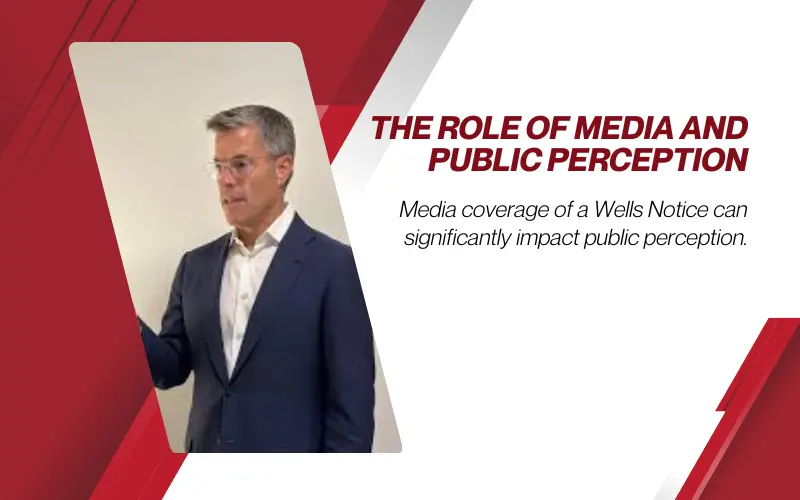If you’ve come across the term “Brook Taube Wells Notice,” you might be wondering what it means and why it is significant. In this Guide, we will explore the Brook Taube Wells Notice in detail, explain its implications, and help you understand why it matters. We will also discuss related topics and provide a comprehensive overview that is easy to grasp. By the end of this article, you will have a clear understanding of the Brook Taube Wells Notice and its relevance.
What is a Wells Notice?
A Wells Notice is a communication from the Securities and Exchange Commission (SEC) informing individuals or companies that the SEC is planning to bring an enforcement action against them.
It is named after John Wells, the chairman of an SEC committee that made recommendations on enforcement practices.
The notice gives the recipient a chance to respond before the SEC decides to file a lawsuit. This response, known as a “Wells Submission,” allows the recipient to argue why charges should not be filed.
Brook Taube and the Wells Notice
Brook Taube is a notable figure in the financial world, particularly in investment and asset management. He has been involved in various high-profile ventures and has held significant positions in different financial institutions.
The Brook Taube Wells Notice refers to a specific instance where Brook Taube received a Wells Notice from the SEC, signaling potential regulatory action against him or his associated entities.
Why is the Brook Taube Wells Notice Important?
The Brook Taube Wells Notice is significant for several reasons. First, it highlights the regulatory scrutiny that high-profile financial figures and institutions can face.
Second, it serves as a reminder of the importance of compliance with SEC regulations. Third, it can have broader implications for the financial markets and investor confidence.
Understanding the SEC’s Role
The SEC is responsible for enforcing federal securities laws and regulating the securities industry. Its primary goal is to protect investors and maintain fair, orderly, and efficient markets.
When the SEC issues a Wells Notice, it indicates that the agency has conducted an investigation and believes there is sufficient evidence to pursue an enforcement action.
This process is crucial in maintaining the integrity of the financial markets.
The Impact of a Wells Notice
Receiving a Wells Notice can have significant consequences for individuals and companies. It can damage reputations, affect stock prices, and lead to legal and financial challenges.
For Brook Taube, the Wells Notice represents a critical juncture in his career, as it brings potential legal and regulatory hurdles that could impact his professional standing and business interests.
Responding to a Wells Notice
When someone receives a Wells Notice, they have the opportunity to respond through a Wells Submission. This response allows them to present their side of the story, provide additional information, and argue against the SEC’s findings.
It is a crucial step in the process, as it can influence the SEC’s decision on whether to proceed with enforcement action.
Crafting a Wells Submission
Creating a compelling Wells Submission requires a thorough understanding of the SEC’s concerns and the ability to present a strong defense. This often involves:
- Legal Expertise: Engaging experienced securities lawyers who can navigate the complex legal landscape.
- Evidence Gathering: Collecting relevant documents and evidence to support your position.
- Argument Development: Clearly articulating why the SEC’s findings may be incorrect or unsupported.
Legal and Financial Implications
The legal and financial implications of a Wells Notice can be substantial. Legal fees, potential fines, and the impact on business operations are all considerations for recipients. Additionally, the publicity surrounding a Wells Notice can affect investor confidence and market perceptions. For Brook Taube, navigating these challenges requires careful legal and strategic planning.
Potential Outcomes of a Wells Notice
The possible outcomes after receiving a Wells Notice include:
- No Action: The SEC may decide not to pursue enforcement after reviewing the Wells Submission.
- Settlement: Reaching a settlement where the recipient agrees to certain terms without admitting wrongdoing.
- Litigation: The SEC may proceed with a lawsuit, leading to a legal battle in court.
How to Avoid Receiving a Wells Notice
To avoid receiving a Wells Notice, individuals and companies should prioritize compliance with SEC regulations. This involves maintaining accurate financial records, adhering to reporting requirements, and ensuring transparent communication with investors.
Regular internal audits and legal consultations can also help identify and address potential issues before they escalate.
Best Practices for Compliance
- Regular Training: Ensure all employees understand and comply with SEC regulations.
- Internal Controls: Implement robust internal controls to prevent and detect violations.
- Transparency: Maintain open and honest communication with investors and regulators.
Case Studies and Examples
Several high-profile cases have involved Wells Notices, providing valuable lessons for the financial industry. By examining these cases, we can gain insights into common pitfalls and best practices for regulatory compliance. Understanding the context and outcomes of these cases can help individuals and companies better prepare for potential regulatory challenges.
Case Study: XYZ Corporation
XYZ Corporation, a well-known investment firm, received a Wells Notice due to alleged misstatements in their financial reports. Their response included:
- Thorough Investigation: Conducting an internal investigation to identify and rectify the errors.
- Cooperation with the SEC: Demonstrating a willingness to cooperate fully with the SEC’s investigation.
- Strengthening Controls: Implementing stronger internal controls to prevent future issues.
The Broader Impact on the Financial Industry
The issuance of a Wells Notice, especially to prominent figures like Brook Taube, can have ripple effects throughout the financial industry. It can lead to increased scrutiny on similar entities and heightened awareness of regulatory compliance. This, in turn, can drive changes in industry practices and policies to enhance transparency and accountability.
The Role of Media and Public Perception

Media coverage of a Wells Notice can significantly impact public perception. For Brook Taube, managing this aspect involves strategic communication to mitigate negative press and maintain stakeholder confidence. Transparency and proactive communication are key strategies in addressing media scrutiny.
Frequently Asked Questions (FAQs)
What is a Wells Notice?
A Wells Notice is a notification from the SEC indicating that it is considering bringing an enforcement action against an individual or company.
Why is it called a Wells Notice?
It is named after John Wells, the chairman of an SEC committee that made recommendations on enforcement practices.
What should I do if I receive a Wells Notice?
Consult with experienced securities lawyers, gather relevant evidence, and prepare a Wells Submission to respond to the SEC’s concerns.
What are the potential outcomes of a Wells Notice?
The SEC may decide to take no action, reach a settlement, or proceed with litigation.
How can I avoid receiving a Wells Notice?
Prioritize compliance with SEC regulations, maintain accurate financial records, and ensure transparent communication with investors.
How does a Wells Notice affect a company’s reputation?
Receiving a Wells Notice can damage a company’s reputation, affect stock prices, and lead to legal and financial challenges.
Conclusion
The Brook Taube Wells Notice is a significant event that underscores the importance of regulatory compliance in the financial industry. Understanding what a Wells Notice is, its implications, and how to respond to it is crucial for anyone involved in finance. By prioritizing compliance and staying informed about regulatory developments, individuals and companies can navigate the complex landscape of financial regulations more effectively.




